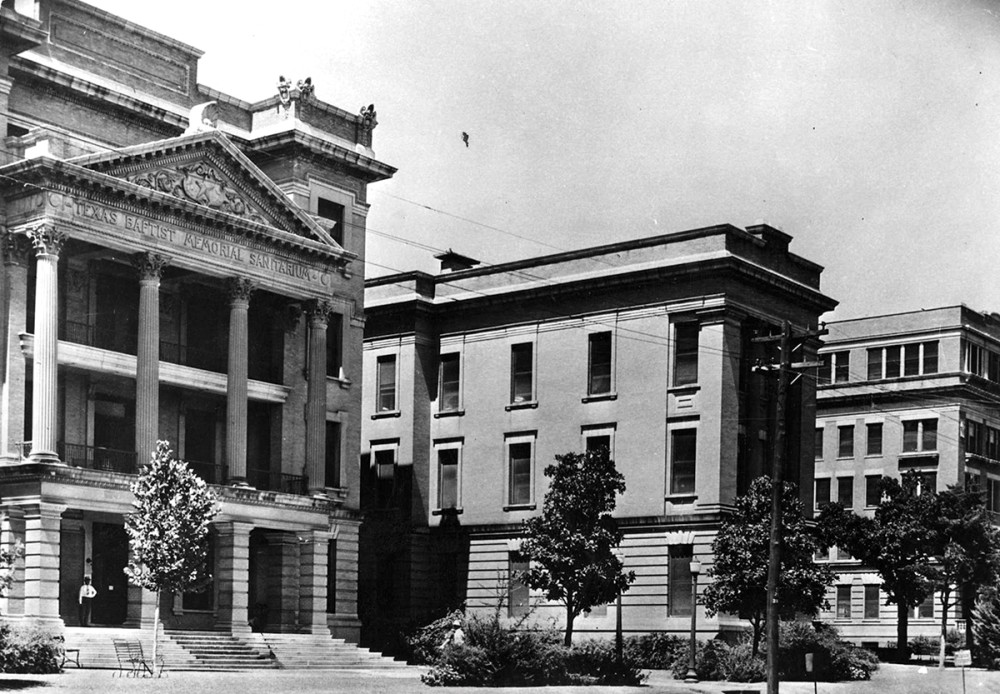
How a Baptist educator’s simple plan gave rise to health insurance
by Helen Jerman in the December 16, 2020 issue
Texas Baptist Memorial Sanitarium, later named Baylor Hospital. (UT Southwestern Library's History of Medicine collection)
In 1929, Baylor Hospital in Dallas had a problem: it was weeks away from insolvency. Teachers in Dallas also had a problem: they couldn’t afford to take time off when they got sick. Fortunately, businessman and educator Justin Ford Kimball found a deceptively simple way to alleviate both problems—and gave birth to the health insurance industry in the process.
Kimball left his teaching career in 1929 to take an executive position within the Baylor University system, according to Samuel Schaal in his book Lone Star Legacy: The Birth of Group Hospitalization and the Story of Blue Cross and Blue Shield of Texas. Chief among his responsibilities was to improve the dire financial situation of Baylor Hospital: its receipts had dropped from $236 to $59 per patient, and occupancy had dropped from 70 percent to 60 percent.

Kimball drew on his decadelong tenure as superintendent of the Dallas public school district, where, among other things, he had created a sick benefit fund in the aftermath of the Spanish flu pandemic. He had asked teachers to pay $1 per month into the fund, which would then pay sick teachers $5 for each day of lost pay due to serious illness.
The idea was a success. About 800 teachers participated, and at the end of the year the fund had a surplus of more than $1,000.
At Baylor, Kimball wondered if he could adapt this model to address some of the hospital’s financial problems.
The idea of health insurance was not new, but the problems of enacting it had stumped insurers for decades, according to Schaal.
With life insurance, it was easy to assess the risk: a person only died once, and an underwriter could evaluate statistics and predict their likelihood of dying within a certain period. It was much more difficult to predict how likely it was that a given individual would become sick or injured. Health insurance companies had formed and then gone bankrupt, and other attempts to provide financial protection against illness or injury had not worked well.
Kimball turned to the data he did have—from the sick benefit fund he had started. In reviewing his records, he found that the fund spent about 15 cents per teacher per month on hospitalizations. With hospital utilization on the rise, he tripled that number and then rounded it up to 50 cents per month.
The Baylor plan, as it came to be known, was extremely simple by today’s standards. It provided 21 days of hospital care at Baylor Hospital, which included labs, operating room, and anesthesia charges. In the event that the hospital was unable to provide services, the plan would pay the member twice the premiums already paid into the plan.
The plan was popular from the start. More than 1,300 teachers participated—almost three-fourths of the district’s teachers.
“In many respects it was the first health co-op,” said Alan Lefever, director of the Texas Baptist Historical Collection and an adjunct professor at Truett Seminary in Waco, Texas. “Everyone pays in, and from the money they pay in, the plan pays out.”
This operating model set a precedent that is one factor in the rising cost of health care today: the plan covered hospital charges no matter how high they were.
The idea soon caught on in various forms across the country. The Baylor plan itself evolved into Blue Cross and Blue Shield.
“Baptists created insurance because there was a need,” Lefever said. “Christians have a responsibility to live by the Golden Rule and to look after each other in all aspects of life. In the late 1920s, to do that, Baptists created health insurance.” —Baptist News Global
This article appears in the December 16, 2020 issue.Helen Jerman is a professional writer and editor who is paralyzed from the knee down due to spina bifida and uses a wheelchair as a result.
We would love to hear from you. Let us know what you think about this article by writing a letter to the editors.
National Baptists choose Connecticut pastor Boise Kimber as next president